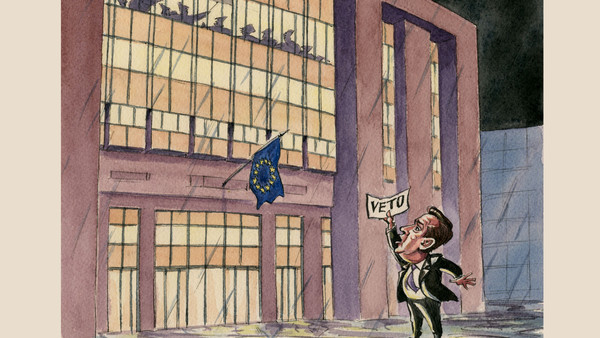The story of British disengagement from the EU is often told as one of a proud island nation struggling to unshackle itself from its neighbours. The political dynamics, though, are changing. As David Cameron’s government shuns the closer integration born of the euro crisis, British pull is now being reinforced by continental push.
European leaders at this week’s Brussels summit have other things on their minds – Greece, Spain and banking union among them. The future of the euro is not yet assured. Mr Cameron has chosen the role of bystander. And yet the outcome of the deliberations could well give another important nudge towards Britain’s departure from the EU.
The prime minister insists that he still backs membership, albeit on renegotiated terms. In a telephone conversation this week with Angela Merkel, he gently chided the German chancellor for scuppering the Europe-wide defence industry co-operation promised by a takeover of BAE Systems by EADS. Nick Clegg, Mr Cameron’s Liberal Democrat coalition partner, counts himself a staunch pro-European. Labour’s Ed Miliband castigates the government for self-imposed isolation in Europe.
Mr Cameron, however, is a prisoner of his party’s anti-Europeans. As they ride the tide of public opinion, he fears the alternative to retreat from the EU is an irrevocable Conservative split. Mr Clegg has proved an inadequate brake on Tory hostility; and Mr Miliband refuses to risk unpopularity by staking political capital on Europe. Beyond the realm of politics, investors in Britain have been slow to wake up to the implications of what the Centre for European Reform has dubbed “Brexit”.
Missing from the domestic debate has been any recognition of the change of mood among other Europeans. In their demands for special treatment, the calculation of successive British governments has been that more federally-minded Europeans would bend to the threat of Britain’s departure. There was some truth in this. But the euro crisis has presented these leaders with more urgent priorities than indulging the veto-waving British.
Soon after Mr Cameron’s coalition was established in the summer of 2010, one of his more stridently eurosceptic ministers was reported to have said that there was no longer a need for Britain to leave Europe because Europe was leaving Britain. The observation has turned out to be more prescient than he imagined.
Europe has tired of London’s demands for exemptions and opt-outs from the rules of the Union. Other leaders have serious business to transact to rescue the euro. If Britain wants out, continental politicians are now heard to say, it should get out.
The prime minister promises a “big speech” on the subject sometime soon. He wants to set out the terms for a new relationship. The plan is to negotiate a series of concessions as the price for British consent to the treaty changes the euro group will need for deeper integration. The package could then be put to the British people in a referendum.
There are several snags to this scenario. The most obvious is that the government is running out of things from which to “opt out”. It is outside the euro and, unlike say Poland, has no intention ever of joining. It has declined to be part of a fiscal pact or banking union. Mr Cameron wants a two-tier budget to separate Britain’s contributions to Brussels from eurozone spending.
Britain has long shunned the Schengen open borders arrangement. Now Mr Cameron plans to withdraw from EU-wide co-operation on matters of crime and justice. Beyond the single market and external trade policy – red lines for everyone else – this leaves precious little left from which Britain can exclude itself.
Another problem lies in the presumption that others will be malleable. In truth, the veto has lost its potency. When Britain deployed it in December last year, eurozone leaders simply created a parallel structure for fiscal co-operation. In France there is positive enthusiasm for such an approach. Germany would once have made an effort to accommodate British exceptionalism. But Ms Merkel has lost patience.
She is far from alone. Mr Cameron has ignored overtures from Mario Monti, the Italian prime minister, for closer co-operation in single market policy. Mariano Rajoy, the centre-right Spanish leader, looks to Berlin rather than London. François Hollande, France’s Socialist president, was never going to be a close chum. Britain’s point-blank refusal to contribute to any of the support mechanisms for the euro has baffled even close allies such as Sweden. Others confess they are tired of British lectures about how they should order their affairs.
Mr Cameron’s administration has run out of what political scientists call “soft power”. The reservoir of goodwill is dry. When Britain demands assurances that the new banking union will not undercut its own influence over financial regulation, others ask why London should remain the continent’s pre-eminent financial centre.
There have been many crises in Britain’s relationship with the EU. This one feels very different. The arrangements for banking regulation may provide a template for a new institutional architecture that effectively excludes Britain from decision-making across the single market. The consequence would be to leave Britain in a position not dissimilar to that of EU outsiders such as Norway and Switzerland – bound by the rules and to pay their dues but unable to shape anything.
Mr Cameron is said to be drawing a road map for Britain’s future in Europe. He has failed to notice that, as they strike out in the other direction of closer union, his partners are content to say goodbye.
philip.stephens@ft.com
Copyright The Financial Times Limited 2012.
See online: Brexit: Europe loses patience with UK

